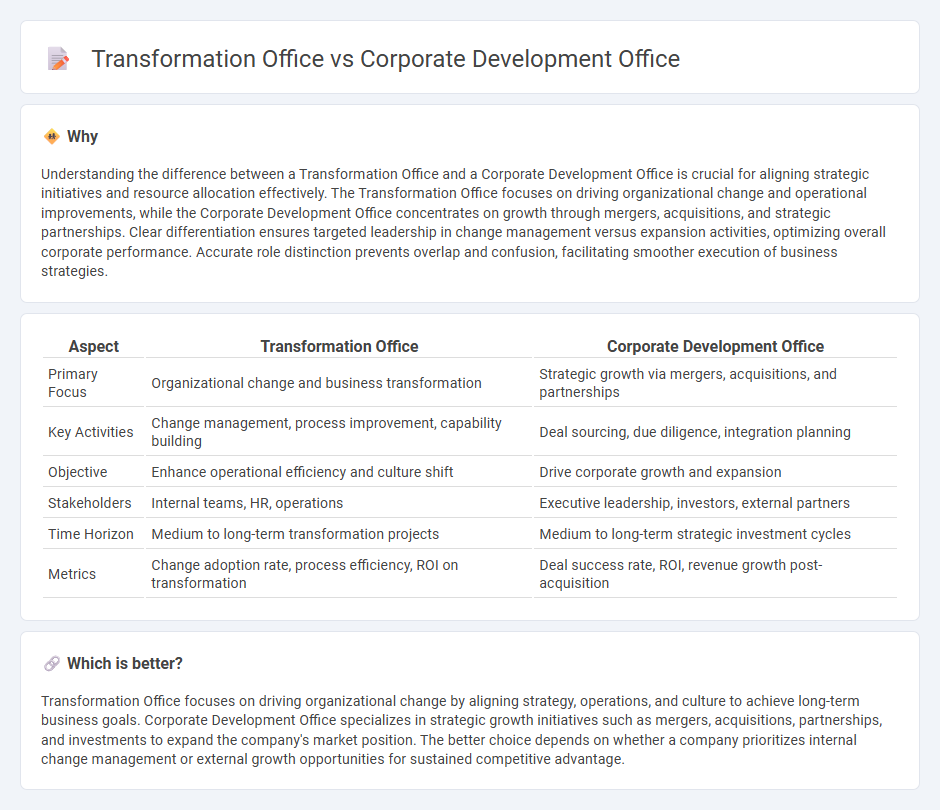
Transformation Offices focus on strategic change management, driving innovation and operational improvements to align business processes with evolving market demands. Corporate Development Offices concentrate on mergers, acquisitions, partnerships, and growth strategies that expand company capabilities and market reach. Explore the distinct roles and benefits of each to better align your organization's growth objectives.
Why it is important
Understanding the difference between a Transformation Office and a Corporate Development Office is crucial for aligning strategic initiatives and resource allocation effectively. The Transformation Office focuses on driving organizational change and operational improvements, while the Corporate Development Office concentrates on growth through mergers, acquisitions, and strategic partnerships. Clear differentiation ensures targeted leadership in change management versus expansion activities, optimizing overall corporate performance. Accurate role distinction prevents overlap and confusion, facilitating smoother execution of business strategies.
Comparison Table
| Aspect | Transformation Office | Corporate Development Office |
|---|---|---|
| Primary Focus | Organizational change and business transformation | Strategic growth via mergers, acquisitions, and partnerships |
| Key Activities | Change management, process improvement, capability building | Deal sourcing, due diligence, integration planning |
| Objective | Enhance operational efficiency and culture shift | Drive corporate growth and expansion |
| Stakeholders | Internal teams, HR, operations | Executive leadership, investors, external partners |
| Time Horizon | Medium to long-term transformation projects | Medium to long-term strategic investment cycles |
| Metrics | Change adoption rate, process efficiency, ROI on transformation | Deal success rate, ROI, revenue growth post-acquisition |
Which is better?
Transformation Office focuses on driving organizational change by aligning strategy, operations, and culture to achieve long-term business goals. Corporate Development Office specializes in strategic growth initiatives such as mergers, acquisitions, partnerships, and investments to expand the company's market position. The better choice depends on whether a company prioritizes internal change management or external growth opportunities for sustained competitive advantage.
Connection
The Transformation Office drives organizational change initiatives while the Corporate Development Office focuses on strategic growth through mergers, acquisitions, and partnerships. Both offices collaborate to align transformation projects with long-term corporate goals, ensuring seamless integration of new business models and operational improvements. Their synergy enhances strategic agility, enabling the company to adapt rapidly in competitive markets.
Key Terms
Mergers & Acquisitions (M&A)
The Corporate Development Office primarily drives Mergers & Acquisitions (M&A) by identifying target companies, conducting due diligence, and negotiating deal terms to support strategic growth. In contrast, the Transformation Office concentrates on integrating acquisitions, optimizing business processes, and ensuring value realization from M&A activities. Explore the distinct roles and impacts of these offices in successful corporate expansions.
Synergy Realization
The Corporate Development Office primarily drives synergy realization through mergers, acquisitions, and strategic investments, emphasizing value creation from combined entities. In contrast, the Transformation Office focuses on operational changes and cultural shifts to integrate and sustain synergies post-transaction. Explore further to understand how these offices collaborate for successful synergy realization in corporate growth.
Change Management
Corporate Development Offices primarily drive strategic growth initiatives including mergers, acquisitions, and market expansion, embedding change management to align organizational capabilities with evolving business goals. Transformation Offices concentrate on comprehensive change management frameworks that facilitate digitalization, cultural shifts, and operational redesign to boost agility and innovation. Explore key distinctions and best practices for managing change in corporate evolution and transformation projects.
Source and External Links
Corporate Development - Corporate Finance Institute - Corporate Development is the group in a corporation responsible for strategic decisions to grow and restructure the business, including mergers and acquisitions, divestitures, and partnerships to leverage the company's value and competitive advantage, acting as a centralized, outward- and inward-looking function to spot opportunities and threats and align deals with corporate strategy.
The Function Of A Corporate Development Analyst | Expert360 - Corporate development is a permanent strategic function within a company that coordinates complex activities such as M&A and joint ventures, works closely with C-level executives, influences corporate strategy, and orchestrates internal and external players to drive structural and financial improvements.
Corporate Development: Definition, Benefits and Models | Indeed.com - Corporate development teams, often led by executives with M&A backgrounds, focus on two main types of duties: management restructuring to improve leadership and corporate growth strategies including entering new markets and M&A, with roles spanning from analysts to VPs working on target identification, negotiations, financing, and strategic communication.
 dowidth.com
dowidth.com